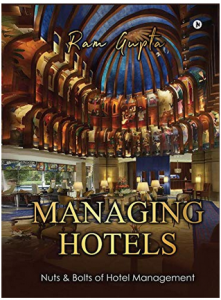The COVID-19 pandemic has unarguably caused the hospitality sector’s worst revenue dips in the last 100 years. Big hotel chains had to scrape their fund barrels while most of the smaller local hotels had to close shop. Human touch, one of the major plus points of hospitality, is being avoided. And thus, hotels had to cut short many of their services during the pandemic, both as a cost saving measure and as a way to limit human contact. But while travelers and hospitality professionals are waiting for things to go back to normal, it might not be the ‘normal’ they expect.
Chris Nassetta, President and CEO of Hilton, has warned that the hotels’ service cuts during the pandemic might be permanent. In a recent investor call, Chris said:
“The work we’re doing right now in every one of our brands is about making them higher-margin businesses and creating more labour efficiencies, particularly in the areas of housekeeping, food and beverage, and other areas. When we get out of the crisis, those businesses will be higher margin and require less labour than they did pre-Covid.”
Now, while this news might be slightly off-putting for travelers who were eager to travel post-COVID, it looks worse for people working in the hospitality industry. And the hammering taken by the hospitality industry seems to have been passed on to the customers and the staff members.
During the peak of the pandemic in mid-2020, job losses in hotels rose to more than 80%. And even those who managed to hang by a thread still had a pay cut of around 50% waiting for them. Hotels had already started letting go of many customer services, including a personal concierge and room services. This statement by the Hilton CEO has left experts wondering if these service cuts will be permanent in the post-COVID era.
What service cuts are we talking about?
The hospitality industry was one of the worst pandemic-hit sectors in the world. The entire functioning of the hospitality industry is heavily based on the human touch. But keeping in mind the COVID restrictions and the hesitation of human contact, hotels had to reduce their contact points to a minimum, thus pushing a heavily contact-based sector towards automation.

For this, hotels had to let go of the many usual services, including room services, housekeeping, concierge, bars or restaurants. In general, we’ve seen hotels eliminate daily housekeeping, cut in-room dining and serve it in to-go bags. We’ve also seen them eliminate in-room amenities, ranging from minibars to coffee machines. And this isn’t even the beginning of it.
Big hotel chains had to transform their services radically. A big hotel group with its headquarters had to do away with its lavish buffets while also reducing its guest capacity by almost 50%. Another hotel chain, too, suspended new reservations at many hotels. All of this resulted from one of the biggest revenue declines in the last 100 years. The gravity of the loss can be perceived by the fact that Indian Hotels Co., the luxury hotel chain that owns the iconic Taj brand, slumped to INR 3.8 billion loss in just six months by the end of 2020! This led the hotels to rethink their business models and make way for automation.
Are hotels moving toward automation?
Definitely. Testing newer trends of hotel management, big hotel chains have already started relying on automated products and services. From Alibaba Future Hotel group to the Marriott group, the use of automation has prominently grown all over the world. Hotels now have robotic concierge, automated room services and cleaning assistants in their pipelines. We also have hotels that are switching to robots with inbuilt UV-rays cleaning systems and using the Internet of Things (IoT) in place of a human room service.
With automated check-ins and check-outs, hotels have reduced the contact points for guests, eventually shedding the use for human resources. The newly rolled out Marriott pilot program in the US features a contactless arrival kiosk that checks in the guests in only three simple steps. The program also includes a new grab-and-go machine that serves breakfasts to the guests. So, yes. Automation is here. And we don’t think it’s likely to go anywhere!

Will everything return to normal?
That’s a difficult question to answer and it depends upon the definition of normal. Hotels have been trying out automated services for a while now, and these services have helped them reduce the requirement for manpower. Now, driven by the huge revenue loss, hotels will look to make it up as soon as possible. They have already been laying off staff for a while now. And if there is an automated machine to replace the laid-off manpower, there’s a chance that the hotels are not going to hire them back.
However, strictly speaking, the competitive hospitality market (especially now) might not allow it. It boils down to a simple demand and supply logic. As the manpower is shed off, the demand for automated services will rise. And frankly, not many hotels in India (apart from the big ones) are equipped to bring in automation, let alone capable of paying the price of one. And it is just a matter of time before someone starts hiring back the manpower, and the market shifts yet again.
Frankly speaking, talking about the services cut being permanent was a bit too ambitious on Hilton CEO’s part, provided this is a B2C service sector that we’re talking about. Any decision that the hotels take is in some way affecting the guests and vice-versa. Therefore, guests are going to be the final decision maker in the long run.
From the looks of it, hotels are planning to introduce the automated systems to reduce the cost of the manpower while charging the pre-COVID amount from the customers. This is a classic example of passing the blow on to the consumers and the staff while saving your own selves. We’ve very recently seen the effect of guests on the hospitality industry. Therefore, hotels might need to be slightly more careful in their interactions. And although the idea of minimizing contact is revolutionary (keeping COVID-19 in mind), monetizing the same with the intention of keeping your own pockets full while letting the guests and staff suffer might just be killing the golden goose.
Ram Gupta, is a hotel management graduate from India, a certified Hotel Administrator from U.S. and MIH from U.K. He has over 40 years of sound experience in the Hospitality industry in India, Dubai, U.K, Europe and Japan and is well versed with all areas of business. He has been associated with over two dozen luxury and boutique hotel projects and has launched two hotel chains in India. He is currently an independent hotel consultant and could be contacted at ramgupta@bcgglobal.com. Website: www.bcgglobal.com
BOOKS ON HOSPITALITY INDUSTRY BY RAM GUPTA


AVAILABLE FROM:
ALSO ON,-
AMAZON KINDLE, KOBO, GOOGLE PLAY & i BOOKS
BOOK STORES IN INDIA
COFFEE CUP – SECUNDERABAD, CROSSWORD – BANGALORE, PUNE, JAIPUR & NOIDA, GANGARAMS – BANGALORE, HIGGINBOTHAMS – BANGALORE & CHENNAI, MODERN BOOK STORE – TRIVANDRUM, ODYSSE – COIMBATORE, OXFORD – DELHI & KOLKATA, STORY BOOK STORE – KOLKATA, TITLE WAVE – MUMBAI, WRITERS CAFÉ – CHENNAI

